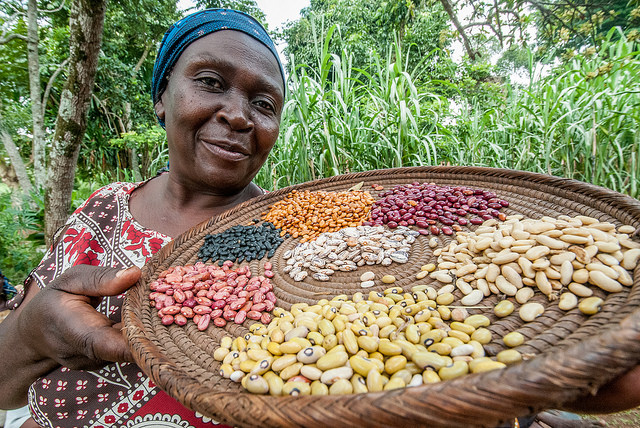
A Ugandan farmer shows 15 varieties of bean seeds. Photo: Georgina Smith / CIAT
We know that what we eat effects our health but something we probably think about less often is how it effects the planet. Research shows that poor diets can be bad for the environment as well as our waist lines. So how can you eat for a healthy body and world?
Despite being essential, agriculture comes at a cost, including in some cases causing pollution, biodiversity loss and high greenhouse gas emissions.
At the same time, increasing rates of obesity and diabetes tell us that the food we are eating is not good for our health. An estimated 35-43 per cent of patients in Australian hospitals are affected by malnutrition, either obesity or under nutrition.
Up until now we haven’t had scientific consensus on how the planet can feed a population of 10 billion people by 2050. We also haven’t had a comprehensive understanding of how food production needs to change to be sustainable.
The EAT-Lancet Commission (a panel of 37 international experts on nutrition, health, sustainability and policy) developed a report on this challenge. The Healthy diets from sustainable food systems report sets out clear, scientific targets for producing higher quality food without depleting the planet’s resources.
Working alongside other international research organisations we have developed global data that provides much needed evidence on how and where our agricultural systems can be more productive and sustainable.
The report recommends radical improvements in the way fertilisers are used; minimising over use and increasing use in regions where fertiliser is under applied. Not only would this increase global food production but also improve the water quality of lakes, rivers and oceans.
The report urges we stop the expansion of new agricultural land at the expense of natural ecosystems and better adapt cropping to environmental conditions.
And not surprisingly, we need to strive hard to reduce greenhouse gas emissions from agriculture.
When it comes to what we’re eating, the report calls for a universal global shift towards healthier diets, with less added sugar and processed foods, and higher consumption of plant foods. In addition, a greater focus on reducing food waste.
The Commission sets out a pathway to achieve healthier and more sustainable food systems. This will not only improve our health but also that of our planet and help us to achieve the UN Sustainable Development Goals and Paris Climate Agreement.


7th February 2019 at 9:22 pm
Interesting article!…..the picture and the caption below are misleading….”A Ugandan farmer shows 15 varieties of bean seeds”…..the basket has only 7 varietes…..